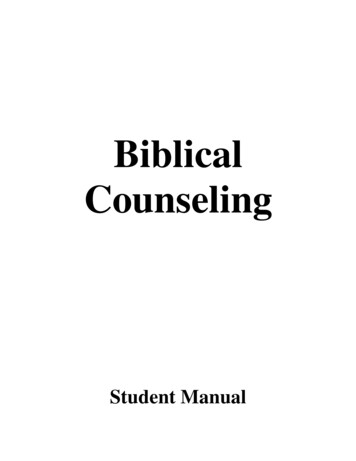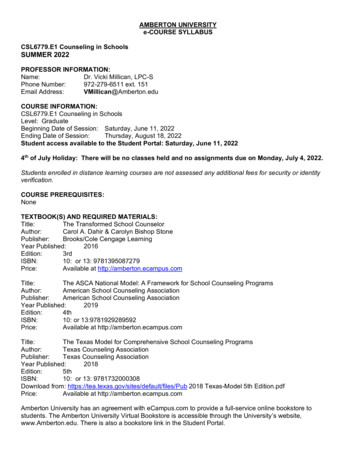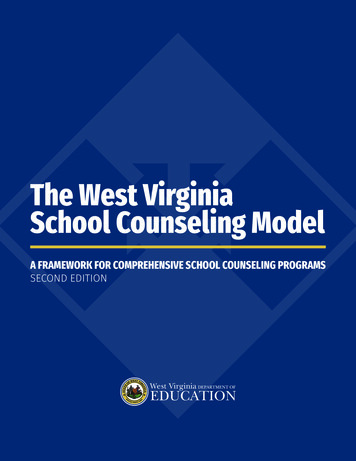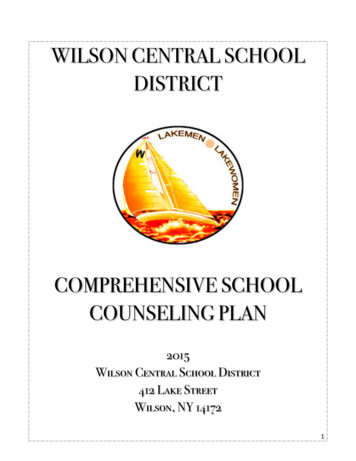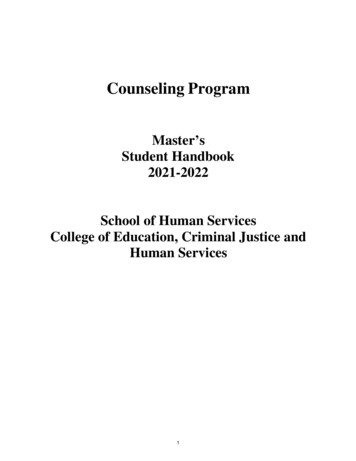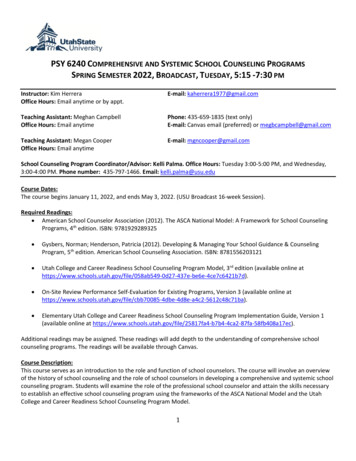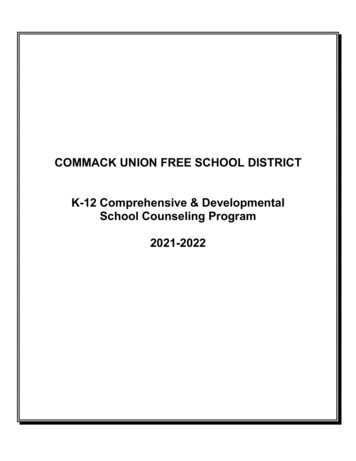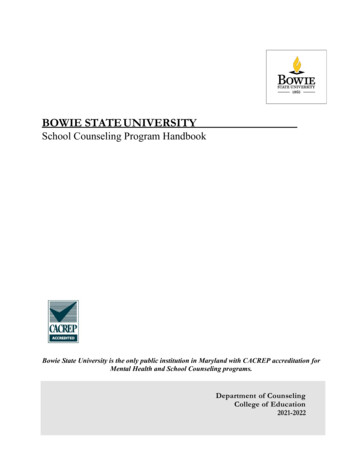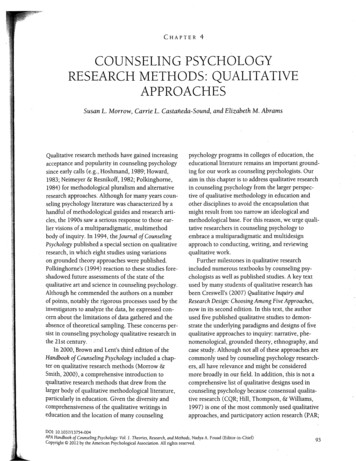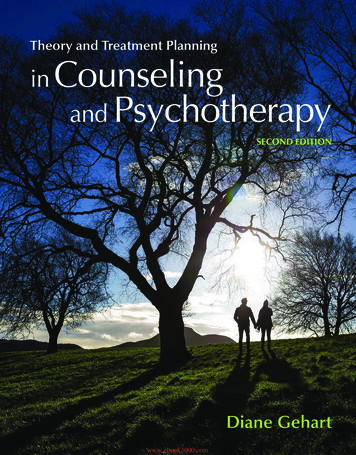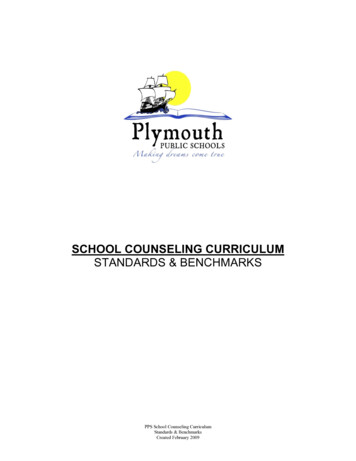
Transcription
SCHOOL COUNSELING CURRICULUMSTANDARDS & BENCHMARKSPPS School Counseling CurriculumStandards & BenchmarksCreated February 2009
IntroductionProfessional school counselors share the proud vision of preparing today’s students tobecoming tomorrow’s adults. To that end, school counselors’ work to help students focus onacademic, personal/social, and career development so they achieve success in school and areprepared to lead fulfilling lives as responsible members of society. Plymouth Public Schools hasadopted standards and benchmarks for a School Counseling Curriculum including thedevelopment of grade level learning outcomes that will provide the necessary framework forimplementing the approved standards and benchmarks in the district’s middle and high schools.All district counselors have had opportunities to review and provide input into thedevelopment of the grade level learning outcomes contained in the School CounselingCurriculum. This feedback was solicited with the following guidelines and understandings:xxxxxThe primary purpose of the Plymouth Public Schools School Counseling Curriculum is tosupport the academic achievement of all students through developing the academic, career,and personal/social skills and knowledge all students need to succeed in school.Grade levels represent the points at which all students should have achieved a specificlearning result. Some schools might combine learning results in such a way that studentsmight acquire the skills or knowledge at an earlier grade level.Counselors utilize the curriculum learning results in terms of student need anddevelopmental appropriateness.As individual schools implement new curriculum, once adopted, they should choose thelearning results for their implementation focus that would have the greatest outcome for theachievement of the standards and benchmarks of the School Counseling Curriculum in theirschool.The School Counseling Curriculum (particularly school counseling activities and units) isopen to revision and continued development.The School Counseling Curriculum is organized into three major components:1. The Plymouth Public Schools Standards and Benchmarks for the School CounselingCurriculum (pages 5-16)2. Massachusetts Career Development Benchmarks3.(pages - )Middle SchoolCounseling Curriculum Activities and Units (separate PDF)These three components comprise the Plymouth Public Schools School CounselingCurriculum, which focuses on achievement of the counseling standards and benchmarks withinthe context of the sixth through twelfth grade curriculum continuum. PPS counselors havebegun and will continue to work together to identify activities, learning materials, andassessments that will support the implementation of grade level learning.The absence of a PreK-grade 5 curriculum is indicative of the fact that PPS no longeremploys elementary school guidance counselors. In essence, school psychologists function in adual role at the elementary level as guidance counselor and school psychologist. Schoolpsychologists and adjustment counselors are beginning to work on a mental health curriculum,or “toolbox,” as part of their professional development. Over time this can be incorporated into,or added to, the School Counseling Curriculum.PPS School Counseling CurriculumStandards & BenchmarksCreated January 20092
BackgroundThe national momentum for standards-based education has elicited an endeavor toprovide clarity of content and common elements to school counseling programs. While it isacknowledged that an entire school is responsible for promoting social/emotional health,career/college planning, and strong academic achievement with their entire student body, thePPS School Counseling Curriculum is intended to provide vision and clarity to that purpose.The PPS Standards and Benchmarks for Comprehensive School Counseling is basedon the ASCA (American School Counselor Association) National Model and is designed toclarify the mission and vision of the school-counseling program. The ASCA National Model: AFramework for School Counseling Programs (2004) was a landmark document that provided amechanism with which school counselors and school counseling teams could design,coordinate, implement, manage and enhance their programs for students’ success. The ASCANational Model provides a framework for the program components, the school counselor’s rolein implementation and the underlying philosophies of leadership, advocacy, collaboration andsystemic change.The Massachusetts School Counselor Association (MASCA), in collaboration with theMassachusetts Department of Elementary & Secondary Education and the National Center forSchool Counseling Outcome Research at the University of Massachusetts Amherst used TheASCA National Model as a template to create The Massachusetts Model for ComprehensiveSchool Counseling (2006). The Massachusetts Model for Comprehensive School Counseling isintended to guide school administrators and counselors in the development of measurablyeffective school counseling programs and to help counselor education programs to align theircurriculum with basic tenets of the model. The Mass Model is intended to benefit students andeducational stakeholders by illustrating how school counseling programs are central to thedistrict and school missions while defining the responsibilities and standards for schoolcounseling delivery and evaluation.The PPS School Counseling Curriculum is proud to incorporate the major tenets fromboth the national model and our state model and it is designed to promote the educational goalsand mission of Plymouth Public School District. Certain initiatives of the PPS school-counselingdepartment have been the catalysts for developing the PPS School Counseling Curriculum.During the 2006-2007 school year high school guidance counselors utilized professionaldevelopment in-service time to begin to plan and write a school-counseling curriculum. In Mayof 2007 the Plymouth South High School Department Chair, Maureen Metta, became a memberof the first-ever Massachusetts Model Implementation Institute. In January of 2008, the districtfunded a new position, a PreK-12 Director of Guidance & Remediation Services. In the summerof 2008, the director and eleven members of the 5-12 guidance/adjustment counseling staffworked together to develop standards and benchmarks and to consolidate the counselingprogram’s existing and new curriculum into a formal document.The PPS Counseling Department would like to thank ASCA and MASCA for theirforesight and leadership in moving the school counseling profession forward into the 21stcentury. The PPS Counseling Department would also like to thank the MassachusettsDepartment of Elementary & Secondary Education for its support of school counselors and theirrole in schools across our state. The PPS Counseling Department would also like to recognizePPS School Counseling CurriculumStandards & BenchmarksCreated January 20093
the contributions of the state of Missouri and the Boulder Valley Colorado School District in theirdevelopment of counseling curriculum standards, benchmarks, activities and units.The Plymouth Public Schools counseling standards and benchmarks will provide schoolcounselors with a strong vision and a sense of purpose for years to come. The counselingcurriculum and its accompanying activities and units will continue to be updated and expandedto include appropriate new interventions in response to emerging student needs. The counselingdepartment also looks forward to continued collaboration with school psychologists andadjustment counselors as they develop their own” toolbox” to provide the best possible servicesto our students PreK -12.Plymouth Public School’s Guidance Department Mission Statement“The mission of the Plymouth Public School’s Guidance Department is to provide acomprehensive developmental counseling program, addressing the academic, career, andpersonal/social development of all students. Without regard to race, gender, religion, sexualorientation, handicap or national origin, we encourage all students to develop realistic conceptsof themselves, along with an understanding of the educational and career opportunitiesavailable to them. Counselors collaborate with teachers, administrators, parents and communityresources and agencies to provide the support necessary to ensure that all students maximizetheir academic achievement and potential. Moreover, we assist school administration inproviding a safe and respectful environment that encourages a diverse student body to becomelife-long, independent, critical thinkers and productive citizens in a changing society.”PPS School Counseling CurriculumStandards & BenchmarksCreated January 20094
Plymouth Public SchoolsSchool Counseling Curriculum Standards & BenchmarksPlymouth Public School District’s school counseling department follows the ASCA NationalStandards for students in the three major counseling domains: Academic Development, CareerDevelopment and Personal/Social Development.Legend:A:A-1.1 Academic Domain, Standard A, Competency 1, and Indicator 1I: Academic DevelopmentASCA National Standards for academic development guide school counseling programs toimplement strategies and activities to support and maximize each student’s ability to learn.Standard A: Students will acquire the attitudes, knowledge and skills that contribute to effectivelearning in school and across the life span.A:A1 Improve Academic Self-conceptA:A1.1 Articulate feelings of competence and confidence as learnersA:A1.2 Display a positive interest in learningA:A1.3 Take pride in work and achievementA:A1.4 Accept mistakes as essential to the learning processA:A1.5 Identify attitudes and behaviors that lead to successful learningA:A2 Acquire Skills for Improving LearningA:A2.1 Apply time-management and task-management skillsA:A2.2 Demonstrate how effort and persistence positively affect learningA:A2.3 Use communications skills to know when and how to ask for help when neededA:A2.4 Apply knowledge and learning styles to positively influence school performanceA:A3 Achieve School SuccessA:A3.1 Take responsibility for their actionsA:A3.2 Demonstrate the ability to work independently, as well as the ability to workcooperatively with other studentsA:A3.3 Develop a broad range of interests and abilitiesA:A3.4 Demonstrate dependability, productivity and initiativeA:A3.5 Share knowledgePURPOSEStudents will envision themselves as capable life-long learners who take advantage ofnumerous learning opportunities and apply effective study skills to a variety of academicsituations. The school-counseling program will provide all students with opportunities to sustaina positive attitude toward learning, set and attain academic goals, and develop and applyeffective study skills.Students in Grades 6-8 will:¾ Develop awareness of learning styles and how they influence school performance¾ Demonstrate the motivation to set goals and achieve individual potential¾ Maintain a positive interest in learning¾ Use time management and organizational skillsPPS School Counseling CurriculumStandards & BenchmarksCreated January 20095
¾ Apply the study skills necessary for academic success at each level¾ Recognize the need for and develop strategies for obtaining academic assistance¾ Develop an awareness of basic learning styles and which style is personally strongest(auditory, visual, kinesthetic)¾ Demonstrate understanding of the importance of effective study skills (e.g., note-taking,test-taking, or task management),¾ Know the various resources available for academic assistance, identify when needed,and implement strategies for accessing, as appropriate¾ Develop and implement structured routines for organizing and planning school work¾ Identify the attitudes and behaviors that lead to successful learning¾ Develop an understanding of the difference between internal and external motivation¾ Describe how one has used knowledge of basic learning styles to help one’s self as alearner¾ Apply the study skills that are personally most effective for enhancing academic success¾ Evaluate the effectiveness of routines for planning and organizing school work andidentify areas for improvement¾ Demonstrate understanding of what motivates one’s self and set goals that helpmaintain a positive interest in learningStudents in Grades 9-12 will:¾ Identify attitudes and behaviors that lead to successful learning¾ Set high but achievable academic goals¾ Refine and apply study skills to enhance success in more rigorous academic coursework¾ Continue to acquire effective time management, organizational, and study skillsnecessary for academic success¾ Understand their individual learning styles to positively influence academic performance¾ Utilize strategies to obtain academic help, including teacher and/or peer assistance,tutoring, and other study skills resources¾ Develop self advocacy skills to become successful learners¾ Use problem-solving and decision-making skills to enhance academic progress¾ Review to-date academic performance and set a goal for improvement¾ Identify any attitudes or behaviors that inhibit successful learning and use problemsolving and decision-making skills to respond appropriatelyStandard B: Students will complete school with the academic preparation essential to choosefrom a wide range of substantial post-secondary options, including college.A:B1 Improve LearningA:B1.1 Demonstrate the motivation to achieve individual potentialA:B1.2 Learn and apply critical-thinking skillsA:B1.3 Apply the study skills necessary for academic success at each levelA:B1.4 Seek information and support from faculty, staff, family and peersA:B1.5 Organize and apply academic information from a variety of sourcesA:B1.6 Use knowledge of learning styles to positively influence school performanceA:B1.7 Become a self-directed and independent learnerPPS School Counseling CurriculumStandards & BenchmarksCreated January 20096
A:B2 Plan to Achieve GoalsA:B2.1 Establish challenging academic goals in elementary, middle/jr. high and highschoolA:B2.2 Use assessment results in educational planningA:B2.3 Develop and implement annual plan of study to maximize academic ability andachievementA:B2.4 Apply knowledge of aptitudes and interests to goal settingA:B2.5 Use problem-solving and decision-making skills to assess progress towardeducational goalsA:B2.6 Understand the relationship between classroom performance and success inschoolA:B2.7 Identify post-secondary options consistent with interests, achievement, aptitudeand abilitiesPURPOSEStudents will know the variety of options available to them after high school, and how to preparefor and access those opportunities. The school-counseling program will provide all students withknowledge and assistance in developing and implementing an educational plan.Students in Grades 6-8 will:¾ Address the challenges experienced with the transition to middle school¾ Begin to apply goal setting techniques and to identify appropriate strategies¾ Select courses with a beginning awareness of long-term educational goals and tomaximize academic achievement¾ Establish challenging academic goals for middle and high school¾ Develop and implement an annual plan of study to maximize academic ability andachievement¾ Use decision-making strategies to establish an educational goal and to identifystrategies for achieving it¾ Use problem-solving and decision-making skills to assess progress toward educationalgoals¾ Apply knowledge of aptitudes and interests to educational goal setting¾ Prepare for the transition to high school including exploring high school planning andhow it impacts post-secondary options¾ Develop an awareness of how educational planning impacts post-secondary optionsStudents in Grades 9-12 will:¾ Address the challenges experienced with the transition to high school¾ Use decision-making skills to establish educational goals and identify strategies forachieving them¾ Develop, implement, and modify an appropriate four-year academic plan¾ Continue to review and revise personal educational goals with an awareness of thefuture implications of one’s choices¾ Demonstrate an understanding of personal educational goals and opportunities, and theimportance of keeping a range of options available¾ Research information about different colleges and other post-secondary options¾ Understand the admissions process for colleges and other post-secondary institutionsincluding academic and testing requirementsPPS School Counseling CurriculumStandards & BenchmarksCreated January 20097
¾ Understand financial aid requirements for colleges and other post-secondary institutions,how to access the various financial aid resources, and how to complete the applicationprocess¾ Identify post-secondary options consistent with interests, abilities, and academicachievementStandard C: Students will understand the relationship of academics to the world of work and tolife at home and in the community.A:C1 Relate School to Life ExperiencesA:C1.1 Demonstrate the ability to balance school, studies, extracurricular activities,leisure time and family lifeA:C1.2 Seek co-curricular and community experiences to enhance the schoolexperienceA:C1.3 Understand the relationship between learning and workA:C1.4 Demonstrate an understanding of the value of lifelong learning as essential toseeking, obtaining and maintaining life goalsA:C1.5 Understand that school success is the preparation to make the transition fromstudent to community memberA:C1.6 Understand how school success and academic achievement enhance futurecareer and vocational opportunitiesPURPOSE:Students will understand the relationship of academics to the world of work. All students shouldhave more successful lives if they are able to pursue careers that utilize their best personalqualities, skills, and educational training. The school counseling program will provide allstudents with knowledge and support in developing the academic and personal skills needed tomake effective school to career choices.Students in Grades 6-8 will:¾ Begin to understand the relationship between educational achievement and careersuccess¾ Begin to evaluate one’s academic and personal strengths and limitations and how theyrelate to various career paths¾ Understand the importance of taking responsibility and accepting consequences forone’s actions¾ Recognize the need for a healthy balance of studies, extracurricular activities, work,leisure time and family lifeStudents in Grades 9-12 will:¾ Demonstrate an understanding of the relationship between educational achievementand career success¾ Identify and evaluate one’s academic and personal strengths and limitations and howthey relate to various career paths¾ Demonstrate an understanding of how interests, abilities, and achievement relate toachieving personal, educational, and career goals¾ Understand the importance of taking responsibility and accepting consequences forone’s actionsPPS School Counseling CurriculumStandards & BenchmarksCreated January 20098
¾ Understand the importance of good work habits, including self-motivation,confidence, and persistence, in both the world of academics and the world of work¾ Understand that personal responsibility, personal integrity, and respectfulcollaboration are important for success in school, work, and personal life¾ Understand the relationship between academic preparation (including extracurricular,volunteer, and work experiences) and career and educational opportunities¾ Understand the relationship between various academic decisions and future careerand educational opportunities¾ Recognize the need for a healthy balance of studies, extracurricular activities, work,leisure time and family lifeII: Career DevelopmentASCA National Standards for career development guide school counseling programs to providethe foundation for the acquisition of skills, attitudes and knowledge that enable students to makea successful transition from school to the world of work, and from job to job across the life span.Standard A: Students will acquire the skills to investigate the world of work in relation toknowledge of self and to make informed career decisions.C:A1 Develop Career AwarenessC:A1.1 Develop skills to locate, evaluate and interpret career informationC:A1.2 Learn about the variety of traditional and nontraditional occupationsC:A1.3. Develop an awareness of personal abilities, skills, interests and motivationsC:A1.4 Learn how to interact and work cooperatively in teamsC:A1.5 Learn to make decisionsC:A1.6 Learn how to set goalsC:A1.7 Understand the importance of planningC:A1.8 Pursue and develop competency in areas of interestC:A1.9 Develop hobbies and vocational interestsC:A1.10 Balance between work and leisure timeC:A2 Develop Employment ReadinessC:A2.1 Acquire employability skills such as working on a team, problem-solving andorganizational skillsC:A2.2 Apply job readiness skills to seek employment opportunitiesC:A2.3 Demonstrate knowledge about the changing workplaceC:A2.4 Learn about the rights and responsibilities of employers and employeesC:A2.5 Learn to respect individual uniqueness in the workplaceC:A2.6 Learn how to write a résuméC:A2.7 Develop a positive attitude toward work and learningC:A2.8 Understand the importance of responsibility, dependability, punctuality, integrityand effort in the workplaceC:A2.9 Utilize time- and task-management skillsPURPOSEStudents will understand the career opportunities available to them and will acquire the skills,attitudes and knowledge to enable them to make a successful transition from school to the worldof work. The school-counseling program will provide all students with knowledge and support incareer planning.PPS School Counseling CurriculumStandards & BenchmarksCreated January 20099
Students in Grades 6-8 will:¾ Begin to develop skills to locate, evaluate and interpret career information¾ Begin to demonstrate knowledge of career exploration¾ Identify personal preferences and interests influencing career choice and success¾ Develop an awareness of the dignity of all careers and that all careers areappropriate to any gender or racial/ethnic group¾ Develop an awareness of personal abilities, skills, interests, and motivations,¾ Develop an understanding of the relationship between academic achievement andcareer success¾ Learn to set goals and make decisions¾ Develop an awareness of personal qualities and motivationsStudents in Grades 9-12 will:¾ Locate, evaluate, and interpret career information¾ Develop and demonstrate knowledge and skills in career planning and decisionmaking¾ Access information on job requirements, resume writing and the interview process¾ Demonstrate an awareness of equal opportunities and access to traditional and nontraditional occupations in the changing workplace¾ Identify personal skills, interests and abilities and match them with career choicesand related career clusters¾ Learn how to work effectively as a team memberCareer DevelopmentStandard B: Students will employ strategies to achieve future career goals with success andsatisfaction.C:B1 Acquire Career InformationC:B1.1 Apply decision-making skills to career planning, course selection and careertransitionC:B1.2 Identify personal skills, interests and abilities and relate them to current careerchoiceC:B1.3 Demonstrate knowledge of the career-planning processC:B1.4 Know the various ways in which occupations can be classifiedC:B1.5 Use research and information resources to obtain career informationC:B1.6 Learn to use the Internet to access career-planning informationC:B1.7 Describe traditional and nontraditional career choices and how they relate tocareer choiceC:B1.8 Understand how changing economic and societal needs influence employmenttrends and future trainingC:B2 Identify Career GoalsC:B2.1 Demonstrate awareness of the education and training needed to achieve careergoalsC:B2.2 Assess and modify their educational plan to support careerC:B2.3 Use employability and job readiness skills in internship, mentoring, shadowingand/or other work experienceC:B2.4 Select course work that is related to career interestsC:B2.5 Maintain a career-planning portfolio PPS School Counseling CurriculumStandards & BenchmarksCreated January 200910
PURPOSE:Students will identify and develop strategies for successful career planning. The schoolcounseling program will provide all students with the tools, resources and support to assist themin their self-directed career planning.Students in Grades 6-8 will:¾ Begin to develop and demonstrate knowledge and skills in career planning anddecision making¾ Begin to actively participate in the career-planning process¾ Begin to identify personal skills, interests and abilities and match them with careerchoices and related career clusters¾ Understand that career choices involve assessing lifestyle values including joboutlook, monetary rewards, and personal satisfaction¾ Begin to assess and modify their educational plan to support career goals¾ Use the internet to access career planning informationStudents in Grades 9-12 will:¾ Develop and demonstrate knowledge and skills in career planning and decisionmaking¾ Actively participate in the career-planning process¾ Utilize information on job requirements, resume writing and the interview process¾ Demonstrate an awareness of equal opportunities and access to traditional and nontraditional occupations in the changing workplace¾ Identify personal skills, interests and abilities and match them with career choicesand related career clusters¾ Understand that career choices involve assessing lifestyle values including joboutlook, monetary rewards, and personal satisfaction¾ Assess and modify their educational plan to support career goals¾ Use the internet to access career planning information¾ Create and maintain a career-planning portfolio¾ Select courses to investigate and/or prepare for career interests¾ Apply effective decision-making skills to course selection and career planningCareer DevelopmentStandard C: Students will understand the relationship between personal qualities, educationand training, and the world of work.C:C1 Acquire Knowledge to Achieve Career GoalsC:C1.1 Understand the relationship between educational achievement and careersuccessC:C1.2 Explain how work can help to achieve personal success and satisfactionC:C1.3 Identify personal preferences and interests influencing career choice andsuccessC:C1.4 Understand that the changing workplace requires lifelong learning and acquiringnew skillsC:C1.5 Describe the effect of work on lifestyleC:C1.6 Understand the importance of equity and access in career choicePPS School Counseling CurriculumStandards & BenchmarksCreated January 200911
C:C1.7 Understand that work is an important and satisfying means of personalexpressionC:C2 Apply Skills to Achieve Career GoalsC:C2.1 Demonstrate how interests, abilities and achievement relate to achievingpersonal, social, educational and career goalsC:C2.2 Learn how to use conflict management skills with peers and adultsC:C2.3 Learn to work cooperatively with others as a team memberC:C2.4 Apply academic and employment readiness skills in work-based learningsituations such as internships, shadowing and/or mentoring experiencesPURPOSEStudents will recognize and develop their personal qualities, attributes and aptitudes for optimalsuccess in their lives and careers. The school counseling program will provide all students withknowledge and support in developing the personal skills and training needed to make effectiveschool to career choices.Students in Grades 6-8 will:¾ Begin to identify personal skills, interests and abilities and match them with careerchoices and related career clusters¾ Understand that career choices involve assessing lifestyle values including joboutlook, monetary rewards, and personal satisfaction¾ Learn how to work effectively as a team member¾ Recognize the connection between academic achievement and career opportunities¾ Apply effective decision-making skills to academic and career planningStudents in Grades 9-12 will:¾ Identify personal skills, interests and abilities and match them with career choicesand related career clusters¾ Understand that career choices involve assessing lifestyle values including joboutlook, monetary rewards, and personal satisfaction¾ Assess and modify their educational plan to support career goals¾ Learn and apply academic and employment readiness skills in work-based learningsituations such as jobs, internships, or mentoring experiences¾ Learn how to work effectively as a team member¾ Understand and apply conflict management skills in school and in the workplace¾ Recognize the connection between academic achievement and career opportunities¾ Apply effective decision-making skills to course selection and career planning¾ Understand the importance of good work habits, including self-motivation,confidence, and persistence, in both the world of academics and the world of work¾ Understand that personal responsibility, personal integrity, and respectfulcollaboration are important for success in school, work, and personal lifeIII: Personal/Social DevelopmentASCA National Standards for personal/social development guide school counseling programs toprovide the foundation for personal and social growth as students progress through school andinto adulthood.PPS School Counseling CurriculumStandards & BenchmarksCreated January 200912
Standard A: Students will acquire the knowledge, attitudes and interpersonal skills to help themunderstand and respect self and others.PS:A1 Acquire Self-knowledgePS:A1.1 Develop positive attitudes toward self as a unique and worthy personPS:A1.2 Identify values, attitudes and beliefsPS:A1.3 Learn the goal-setting processPS:A1.4 Understand change is a part of growthPS:A1.5 Identify and express feelingsPS:A1.6 Distinguish between appropriat
The PPS Standards and Benchmarks for Comprehensive School Counseling is based on the ASCA (American School Counselor Association) National Model and is designed to clarify the mission and vision of the school-counseling program. The ASCA National Model: A Framework for School Counseling Programs (2004) was a landmark document that provided a
